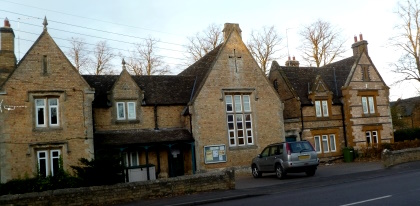
************************
John 1:6-8 and 19-28
Good News Translation (GNT)
*************************
6 God sent his messenger, a man named John,
7 who came to tell people about the light, so
that all should hear the message and believe.
8 He himself was not the light; he came to tell
about the light.
John the Baptist's Message
19 The Jewish authorities in Jerusalem sent
some priests and Levites to John to ask him,
"Who are you?"
20 John did not refuse to answer, but spoke out
openly and clearly, saying: "I am not the
Messiah."
21 "Who are you, then?" they asked. "Are you
Elijah?" "No, I am not," John answered.
"Are you the Prophet?" (a) they asked.
"No," he replied.
22 "Then tell us who you are," they said.
"We have to take an answer back to those
who sent us. What do you say about
yourself?"
23 John answered by quoting the prophet Isaiah:
"I am 'the voice of someone shouting in the
desert: Make a straight path for the Lord to
travel !'"
24 The messengers, who had been sent by the
Pharisees,
25 then (b) asked John, "If you are not the
Messiah nor Elijah nor the Prophet, why do
you baptise?"
26 John answered, "I baptise with water, but
among you stands the one you do not know.
27 He is coming after me, but I am not good
enough even to untie his sandals."
28 All this happened in Bethany on the east side
of the Jordan River, where John was
baptising.
Footnotes
John 1:21 The one who was expected to
appear and announce the coming of the
Messiah.
John 1:25 The messengers, who had been
sent by the Pharisees, then;
or
Those who had been sent were Pharisees;
they.
*************************
Commentary taken from
'The Applied New Testament Commentary'
(Kingsway)
The Testimony of John the Baptist
Here John describes
the coming of John the Baptist,
who was sent from God,
with a specific purpose:
namely, to testify
concerning the light of Jesus.
John came to prepare
men's hearts to receive
that light,
and witnessed to Jesus,
so that through him (John)
all men might believe
(in Jesus).
"All men"
means both Jews and Gentiles.
Christ and John the Baptist
(1:19-28)
When John the Baptist
began to preach,
many people came out
to hear him and were baptised.
When the Jewish leaders
heard about John,
they wanted to find out
about this new prophet.
Therefore, they sent priests
and Levites from
Jerusalem to inquire.
John knew that the
Jewish leaders thought
that he himself might
be the Christ.
All the Jews were
expecting the Messiah,
to come and deliver
them from bondage
to the Roman Empire
and to re-establish
the independent
kingdom of Israel.
But John immediately
told them that
he was not the Christ.
Then the Jewish leaders
asked John if he was Elijah.
Elijah was one of the
greatest prophets
of the Old Testament.
He did not die
in an ordinary way,
but was carried up
to heaven in a whirlwind.
The prophet Malachi
prophesied that Elijah
would return before
the great and dreadful
day of the Lord.
The Jews interpreted
this prophecy to mean
that Elijah himself
would return before
the Messiah came.
John told them that
he was not Elijah.
Then the Jewish leaders
asked John
if he was the Prophet.
Moses had prophesied
that a prophet like himself
would rise up from among the Jews.
This prophet was thought
by the Jews to be
different from
Elijah and the Messiah.
Again John the Baptist
denied that he was this prophet.
Finally, the priests and Levites
asked John, "Who are you?"
And John answered,
in the words of
the prophet Isaiah,
that he was the voice
of one calling
in the desert.
He was appointed
to announce the coming
of the real Messiah,
Jesus (The Christ.)
Some of the Jews
questioning John
were Pharisees,
the strictest sect of the Jews.
They wanted to know
from where John the Baptist
got his authority to baptise.
It was a common practice
for the Jews to baptise
Gentiles who wanted
to become followers
of the Jewish religion,
but nobody baptised Jews.
"We don't need
to be baptised,"
the Jews thought.
"We are not sinners
like the Gentiles."
Therefore,
they wanted to know
who was this John,
who was baptising Jews.
John did not answer
their question directly.
He said, "I baptise with water.
My baptism is an
ordinary baptism.
But there is one here
in the crowd
who will baptise you
with the Holy Spirit."
John's meaning was this:
The Jewish leaders
shouldn't question
John's authority.
He was only the announcer
of One who had
much greater authority.
The Jordan River
where John baptised
formed the eastern
border of Israel;
it was about eighteen
miles from Jerusalem.
The Bethany mentioned
here is not the same Bethany
where Mary and Martha lived,
which was much closer to Jerusalem
(John 11:1).
Other versions are available here
Return to the Home Page

Contact the Rector
The Revd.Nic.Edwards
The Rectory,
Church Lane,
BUGBROOKE,
Northampton,
NN7 3PB
Land Line: 01604 - 815496
(Can be accessed from the mobile device)
Mobile: .....
E-mail:
thebeneficeofbhkandr at gmail dot com
Contact the Benefice Office
Sunday School Rooms, Church Lane,
BUGBROOKE, Northampton, NN7 3PB
Land Line: 01604 830373
E-mail:
thebeneficeofbhkandr at gmail dot com
Mon., Tues., Wed,, Thur., Fri.
9:00am to 11:30am

For Baptism bookings (Christenings)
to arrange an appointment please contact
the Benefice Office.
For Wedding bookings:
please contact the Benefice Office to arrange
an appointment.
Who Made This?
Seeing as you asked, if you can give helpful
advice or report factual corrections and
'deliberate mistakes',email:-
regparker3 at gmail dot com
Email addresses shown using words in an attempt to avoid 'spam',
Type the email address replacing 'at' with '@', and 'dot' with '.'
|


